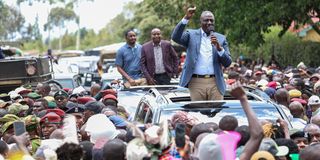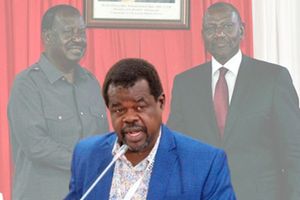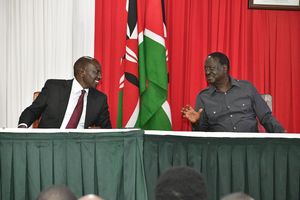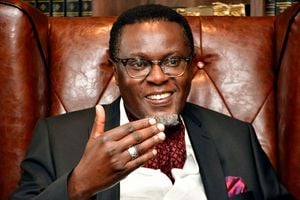
President William Ruto addresses of Nanyuki after laying a foundation stone for the construction of 10 classrooms at Nanyuki DEB Primary and Junior Secondary School in Laikipia County on April 1, 2025
President William Ruto’s claim of a Sh10 billion demand by his former deputy Rigathi Gachagua in exchange for support after the latter had also said the Head of State offered him Sh2 billion has exposed Kenya’s transactional politics.
The allegation by the President has triggered debate on the nature of politics in Kenya and abuse of office by leaders willing to dish out billions of taxpayers’ shillings for loyalty, especially as elections approach.
There has been talk of bribery during coalition-building as some players sacrifice their ambitions in exchange of money, and on condition of delivering ethnic voting blocs.
Speculation has also been rife of money changing hands in ceasefire deals between Orange Democratic Movement (ODM) leader Raila Odinga and presidents. Mr Odinga first reached a truce with President Uhuru Kenyatta in 2018, with the latest being with Dr Ruto this year.
At the height of the opposition-led protests in 2023, President Ruto’s Economic Adviser, David Ndii, said the government was ready to spend taxpayers’ funds to buy off Mr Odinga and ensure stability.
“The first obligation of a government is survival and political stability. The more the dynasties foment destabilisation, the more we will have to spend on political capital. If push comes to shove, a handshake is always an option,” he posted on X on April 8, 2023.
,“We will buy him with your money and you will get nothing,” Dr Ndii posted in response to another X user who had indicated that the opposition supporters were waiting for direction from Mr Odinga on mass action.
The claim by the President on Monday has given credence to similar allegations in the past, including instances of MPs being bribed by the Executive to reject reports or pass bills.
Similar claims have swirled during the East African Legislative Assembly elections, where candidates have reportedly parted with hundreds of thousands of shillings to win the backing of lawmakers.
President Ruto also “opened up” on the intrigues that led to the impeachment of Mr Gachagua.
“Before the election, when I was DP, I called Mt Kenya leaders in Karen. They did not agree and I asked them to vote. Kindiki got 27 votes and Gachagua five. I then called them and persuaded them that I would settle on an elderly person,” President Ruto said.
Perennial complainant
“Gachagua then became a perennial complainant, accusing everyone of undermining him. I sat down with Gachagua and told him to stop the fights. He then asked for Sh10 billion from me or he would make me a one-term president. I refused to be blackmailed,” President Ruto said.
Mr Gachagua, who in February said the President offered him Sh2 billion to resign as his deputy, dismissed the claims, describing Dr Ruto as a pathological liar.
“The greatest existential threat to our beloved country is outright lying to the people of Kenya without blinking, and failure by a leader to put his team together to harmonise their lies. I weep for my country,” Mr Gachagua posted on X.
In a past interview, he said Dr Ruto offered him Sh2 billion to resign instead of being impeached.
“The President asked me to step down, promising Sh2 billion for a comfortable retirement with proper security and a good salary. He said I could run for office later,” Mr Gachagua said.

Former Deputy President Rigathi Gachagua.
“If a person who plans evil against you and asks you to take a certain route, will you? I will go in the opposite direction. He even sent some MPs to persuade me to resign.”
Jubilee Party Secretary-General, Jeremiah Kioni, told Daily Nation that the allegation by the President is self-incriminating as it confirms that there was discussion about money, “only that the two people disagreed on the amount”.
“These are enough grounds for impeachment because they speak directly to Chapter Six of the Constitution. There is no dignity for the President and Mr Gachagua. It appears it was a case of a willing-giver, willing-receiver,” Mr Kioni said.
Before the 2022 General Election, then-Jubilee Secretary-General Raphael Tuju said President Uhuru Kenyatta had paid Dr Ruto for his backing in the 2013 contest.
Dr Ruto and Mr Kenyatta joined hands and contested the 2013 vote through their United Republican Party and the National Alliance, respectively.

President William Ruto addresses Laikipia residents on April 1, 2025. He is accompanied by Deputy President Kithure Kindiki (centre) and Laikipia East MP Mwangi Kiunjuri.
“Let the people of Mt Kenya not think that Ruto supported Uhuru willingly. This is a person of blackmail. He was paid. I can confirm before a court of law,” Mr Tuju said in an interview on July 27, 2022.
“He came with conditions that had to be met in order to support Uhuru. Politics is a business to him. That is why he had to be given a 50 per cent share when he was making appointments in the Cabinet and parastatals. He gave the money to his people and friends.”
Sh7 billion
Pressed about how much the then-deputy president was paid, Mr Tuju responded: “For a man who refers to Sh7 billion as ‘only’ (he was referring to Ruto’s dismissal of a part payment for the scandalous Kimwarer and Arror dams whose contracts President Kenyatta cancelled), your guess is as good as mine. It was in the billions of shillings.”
Mr Tuju was then asked who paid the money.
“Many people who supported President Kenyatta went out of their way to collect this money and make Ruto come on board,” he said.
He, however, added that reports about the huge payments shouldn’t surprise anyone.
Mr Tuju cited another case of a politician from Western Kenya “who demanded Sh900 million from Mr Odinga for support”.
“That is the currency of those politicians,” he said.
University lecturer, Macharia Munene, says politics in Kenya has always been transactional, adding that there is nothing new in Dr Ruto’s claims.
“We have had these arrangements for long. In this particular case, it is like they failed to agree on the amount. Gachagua could have made a counter-offer, which was rejected,” Prof Macharia Munene says.
“It is the main reason politicians form parties. They are being bought. The fact that President Ruto and Mr Gachagua entertained such discussions does not reflect well on them.”
The Daily Nation has established that one of the main coalitions fell out with a senior politician following demands for hundreds of millions of shilling in the last presidential election.
According to a top figure in the coalition who spoke off record, the said politician also demanded brand new vehicles for campaigns. They disagreed and the politician joined the opposing camp.
While in the opposition Coalition for Reforms and Democracy in 2015, Wiper Party chief Kalonzo Musyoka said the then-Jubilee administration approached him with an offer to join the government.
“I am not ready to receive money. That is poisoned chalice, which they (Jubilee) are attempting to offer me. My morality cannot be compromised,” Mr Musyoka said at a fund-raiser for Wote Seventh Day Adventist Church in Makueni County.
Gatanga MP, Edward Muriu, an ally of Mr Gachagua, described the Sh10 billion demand claim as baseless and designed to hoodwink the people of Mt Kenya.
He demanded that President Ruto explain why the demand was not part of the impeachment charges against Mr Gachagua in the National Assembly and Senate.
“Pressure was being put on Gachagua to resign so that Ruto could come out and say ‘it is not I who removed him, he quit. We knew the trick and advised Gachagua to fight to the end,” Mr Muriu said.
He also dismissed Dr Ruto for saying he had no role in the Gachagua impeachment and removal of Mt Kenya MPs from parliamentary committees.
During the interview, President Ruto described Kiharu MP Ndindi Nyoro as a “fine gentleman I will continue to mentor politically”.
“He was the chairman of a parliamentary committee, but their term expired. I am not sure if he offered himself for re-election, but it is MPs – not the President – who vote,” he said.
“MPs from Mt Kenya chaired 12 of the 25 parliamentary committees before the recent changes. MPs from Rift Valley led nine committees. Mt Kenya and Rift Valley had to vacate six seats for others,” the President said.
Mr Muriu said the changes in the committee leadership were orchestrated by Dr Ruto through National Assembly Leader of Majority Kimani Ichung’wah.
“Ruto is a micro-manager and Ichung’wah is the executioner. The list of members of committees and proposed leaders comes from State House,” the lawmaker added.
“MPs supporting Gachagua or the ones deemed to be in the axis of resistance were removed from influential committees and thrown into kitchen and microphone teams of the National Assembly and Senate.”
Mr Muriu said he was one of the victims.
“I was removed from all the committees and placed in the broadcasting team – a lawyer of more than 28 years' practice, founder member of the United Democratic Alliance and Secretary of Legal Affairs,” he said.
US-based university don, David Monda, describes the five-day tour of Mt Kenya by the President as important, adding that it sets the tone for 2027.
“It is possible but highly improbable for President Ruto to turn the tables. Raila is the de facto co-president. Ruto is dependent on him for support and some measure of national legitimacy,” Prof Monda says.
“This makes turning the tide in the region more difficult, especially given the fact that Raila and ODM campaigned against Ruto but are in government. The other element is the projects promised. Most are stalled or dead.”











